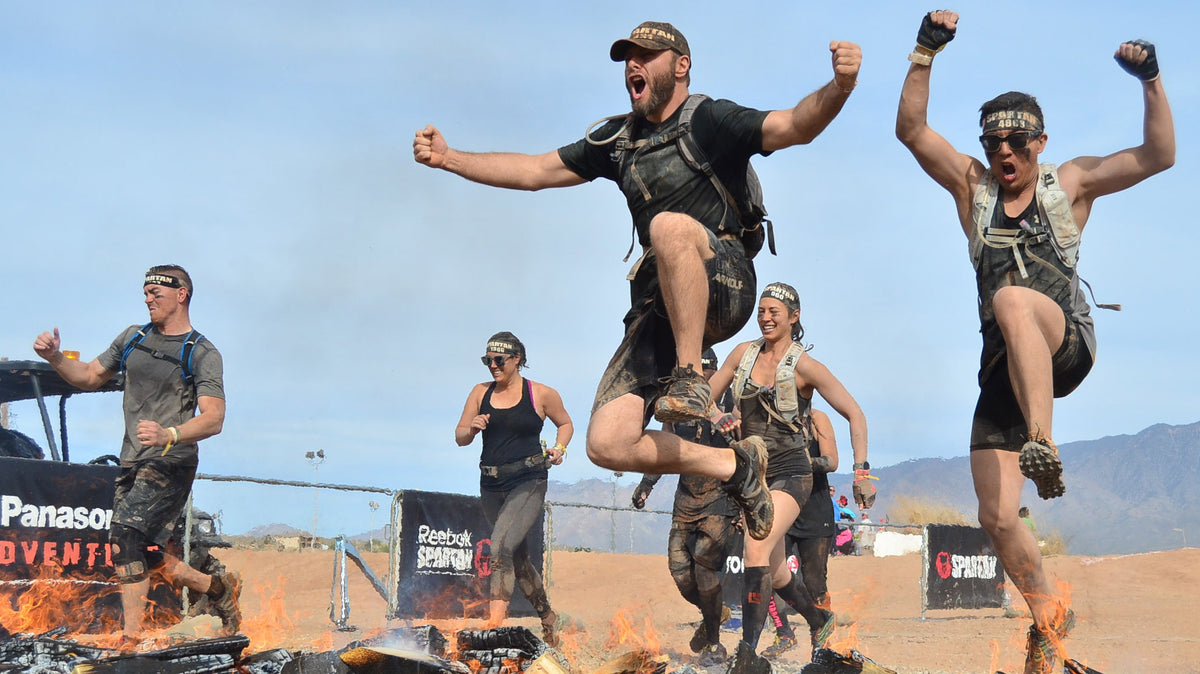This Meal Plan Fuels Athletes for Faster, More Efficient Recovery

Everybody wants to know how the highest-level athletes fuel their bodies for elite competition. What are their go-to foods? Which diets do they rely on for max performance? How do they strategically break up their day? In Eat Like a Champion, a recurring franchise, we give you the inside scoop on our professional athletes' dietary habits: what they're eating, why they're eating it, and when they're eating it. Follow their lead and fuel like a champion.
One of the most compelling reasons that veteran and Spartan SGX Coach Mike Deibler, MS, CSCS, has enjoyed success as an OCR coach is staked in his athletic past — a reason that transcends his many credentials.
At the end of his collegiate high-jumping career, where he achieved All-American honors, one might assume Deibler was in peak physical health. That wasn’t the case, however. He was beaten up, burnt out, and broken down, with his body overwrought from years of training and competition.
As he details in his book, Fuel and Fire, it was (as odd as it might seem to some) through Spartan training and racing that he revived his physiology and restored his health and fitness.
Related: This Simple Approach to Eating Will Enhance Your Cognition Every Day
Crucial to this journey back to athletic health was putting a heavy emphasis on recovery. This emphasis is absolutely crucial to the training philosophy that he lays out in his book (and adheres to while coaching his athletes).
Fueling Consistent Performance With Intentional Recovery
As the title of his book implies, fueling is a massive part of the recovery-for-performance puzzle.
“The most significant change [to my diet] that I have made — and that most of my clients have made — is building an understanding around how to match your daily nutrition with your daily activity,” Deibler says. "Often when someone talks about calories and macronutrients, we see a blanket recommendation like, ‘You should hit 2,000 calories per day with 30% fat, 40% carbs, and 30% protein.'"
While this is potentially good advice, Deibler says, if the advice is given without taking into account a person's specific training demands and overall context, it may (and likely will) come up short.
“If you look at their overall training, you may see that some days they are performing high-intensity work, some days moderate-intensity, and some days they are stuck at work at a desk and doing very little,” he explains.
Related: 5 Perfect Lunches for Fueling Tough Weekly Training Sessions
With this in mind, a branded diet with a rigid, unpersonalized protocol is liable to miss the mark.
“It makes more sense to match your nutrition with the type of activity you are performing,” Deibler says.
Aligning Nutrition With Your Specific Demands
While coaching his OCR athletes, Deibler will support whatever dietary approach that might be working out well.
“If I have an athlete who prefers to follow a specific meal plan, and it has worked for them in the past, then I will incorporate that into their program,” he says.
With that being said, however, he wholeheartedly resists the notion that there’s any one-size-fits-all diet.
“Most of these different diet plans will work for different people," Deibler explains. "We have all heard about those who do awesome things while following Paleo or vegan plans, but that doesn't mean the diet works for everyone. And just because one way works for you doesn't mean that all other ways are wrong.”
 Deibler's client, Jen Rhoton, pictured above, follows her coach's recovery-first approach to fueling as part of her successful training and race prep.
Deibler's client, Jen Rhoton, pictured above, follows her coach's recovery-first approach to fueling as part of her successful training and race prep.
From a coaching perspective, Deibler avoids the diet-tribalism fray and keeps his eye on certain performance targets.
Related: 12 of the Best Training-Friendly Nutrition Tips, According to Experts
“I don't like to put fueling into these different categories," the Spartan coach says. "If you look at nutrition as simply a way to deliver nutrients to the body to help it function, then you will see that there are a variety of ways you can do that.
"For most athletes, you can take pieces of all of the different diets out there and make them work for you as a consistent meal plan without falling into a specific category or the diet trap.”
The ONE Most Important Thing When It Comes to Nutrition
Planning, Deibler says, is the absolute most important nutritional variable, in his opinion. He explains to his athletes that figuring out what and how you should eat makes little difference if you don’t habitually plan on how you’re going to make it all happen.
“You simply have to plan ahead for as long as it takes to become just an automatic way of eating,” he says. “If you were to walk into the gym with absolutely no plan at all, how effective would your workout be — especially if you haven't deliberately been training in the past?”
The same goes for nutrition, Deibler says.
“Going into a day with no clue what you are going to eat just doesn't work," he explains. "The more detailed you can get with planning ahead, the easier and easier it gets. It is essentially writing a food log before you eat versus during or after you eat.
"Then you can start to see how you need to adjust your day and your eating plan to meet your specific needs.”
Related: This Is the Ideal Daily Meal Plan for Powering Through Sprint Workouts
Deibler says that subscribing to this discipline may even pay off in surprising ways. Can you imagine the results you would get if you put as much time and effort into your nutrition as you did with your training?
“It’s hard, and maybe not much fun to plan like this," Deibler admits. "But if you are consistent, you will form a new habit that becomes more and more effortless.”
The following is how Deibler has dialed in his nutrition through this careful and deliberate planning and executing process.
Deibler's Recovery Meal Plan for Fueling Tough Weekly Training
Early Morning: Fast Extension
- Water
- Multivitamin
- Fish oil
- CBD gel
- Black coffee with collagen protein
As he describes, an optimized nutritional approach might borrow from a number of dietary disciplines. Deibler starts his day in a fasted state, consuming the above, which looks like a component pulled straight out of keto. But as you’ll see, carbs flow into his meals at different points in the day.
Late Breakfast: All-Around Omelet
- 4 whole eggs
- Feta Cheese
- Spinach
- Mushrooms
- Tomatoes
This is a perfect example of this SGX Coach's go-to egg scramble recipe.
“I will usually have a meal like this — one that's higher in protein and veggies and fruit," he says. "And I use coconut oil to cook.”
Lunch: Balanced Basics
- Grilled chicken
- Green vegetable
- Avocado
- Rice
“Ninety percent of the time I will have leftovers at lunchtime,” he says, explaining that simplicity and ease are key while checking off the basics. “It will typically contain a protein, a carbohydrate, and a vegetable.
Pre-Afternoon Workout
- Juice with creatine
Deibler drinks his juice with either creatine or some other pre-workout mixture. He has this 1-2 hours after lunch, so he’s already fairly well-fueled.
Post-Workout: Super Smoothie
- Frozen banana
- Berries
- Greens powder or spinach
- Whey protein
- Nuts or nut butter
Carbs, protein, healthy fats, and phytonutrients all combine in the blender to make Deibler's high-performance smoothie.
“This is my go-to smoothie recipe," he says. "Also, I’ve been trying out oat milk lately.”
Dinner: Nothing Fancy
- Ribeye steak
- Sweet potato with butter
- Steamed green beans
This complete dinner features protein, nutrient-dense carbs, fats, and even something green.
Evening Snack: A Craving Killer
- Yogurt with honey or strawberries
“I tend to consume most of my calories in the afternoon and evening, since I fast most mornings,” Deibler says. “I try to keep it a higher-protein snack, but fruit usually helps with any cravings.”

